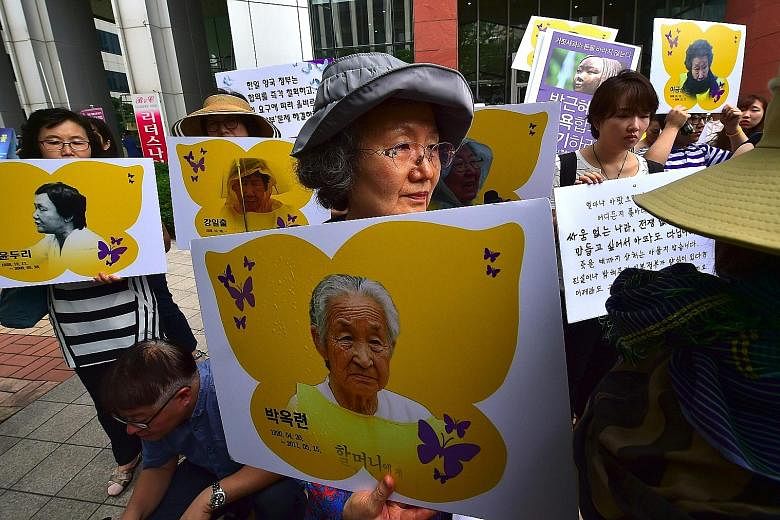South Korea and Japan are on track to implement the landmark deal struck last December to irreversibly settle a longstanding dispute over wartime sex slaves, with their governments making "significant progress" in talks last Tuesday on follow-up measures.
But the road ahead will be bumpy, said analysts, citing protests by civic groups in South Korea, the opposition bloc's continued efforts to revoke the deal, and differences in opinion between the two countries.
On Wednesday, a 2,300-strong crowd gathered outside the Japanese embassy in Seoul to join a weekly protest organised by a civic group to demand justice for comfort women, a day after officials from the two sides met to iron out issues related to implementing the deal.
Protests will continue as long as people refuse to accept the South Korean government's justification of the deal, and this could put road blocks in future talks between the two states, said Dr Lee Myon Woo of the Sejong Institute think-tank.
South Korea and Japan announced the deal to settle a long-standing row over comfort women - as the more than 200,000 women, mostly Koreans, forced into sex slavery by the Japanese army in World War II are euphemistically known - that includes an apology from Japanese Prime Minister Shinzo Abe and a one billion yen (S$13.3 million) fund to make amends to the victims.
The deal was criticised for not seeking adequate responsibility from Japan, and opposition parties have demanded that it be re-negotiated. Several victims complained that they were not consulted beforehand and rejected the terms.
A key issue discussed at Tuesday's meeting was the disbursement of the fund for the foundation set up in Seoul last month to support comfort women, the Reconciliation and Healing Foundation.
Another question raised was how the money should be spent - an issue that divides the two countries. The South Korean side views the fund as a form of compensation for comfort women victims, but Japan wants to make sure the money is not deemed as reparations.
Professor Lee Jung Hoon from Yonsei University's Graduate School of International Studies said legal compensation was covered under a 1965 treaty signed between South Korea and Japan to normalise bilateral relations. Japan provided US$800 million (S$1 billion) in grants and soft loans as compensation for all war crimes, but activists in South Korea insist the comfort women issue is a different category of human rights violation.
Prof Lee said Japan's one billion yen pledge now is "more about ethical and moral responsibility".
"The Japanese government feels remorse and an ethical responsibility to do something in hindsight. It is not a compensation," he added.
Dr Lee said there is a "big gap" between the Japanese government's stance and the victims' perception of the money as a form of compensation. As a result, there are also differing views on when and how to allocate the money, he added.
It is not known yet when Japan would transfer the funds it promised. Some Japanese politicians called for the money to be given only after the removal of a comfort woman statue outside the Japanese embassy in Seoul, but the South Korean government has insisted it has no authority over the statue as it was erected by private civic groups.

